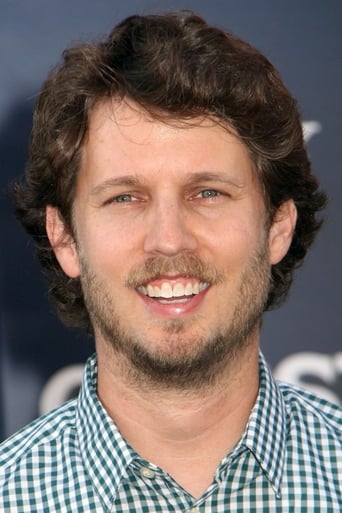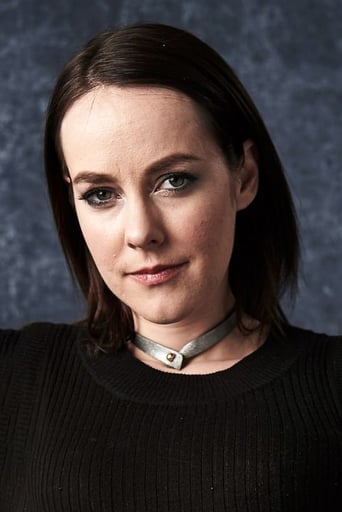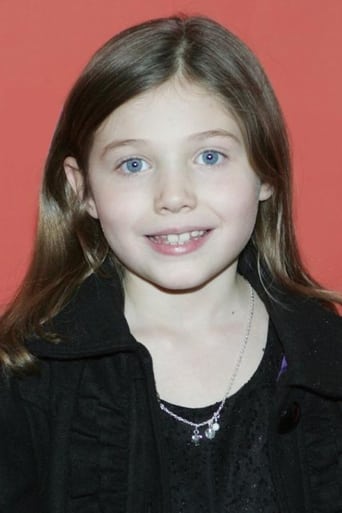Platicsco
Good story, Not enough for a whole film
Claire Dunne
One of the worst ways to make a cult movie is to set out to make a cult movie.
Anoushka Slater
While it doesn't offer any answers, it both thrills and makes you think.
Ginger
Very good movie overall, highly recommended. Most of the negative reviews don't have any merit and are all pollitically based. Give this movie a chance at least, and it might give you a different perspective.
bob-790-196018
As someone who detests most rock music, particularly the screaming histrionics of performers like the one played by Paul Dano in "For Ellen," I was surprised to find myself empathizing with his character, Joby Taylor. As the lead singer in a band, he may be on center stage surrounded by shouting fans, but in this movie we see him against a backdrop of ordinary suburban life, and he seems like a creature from outer space--a weird alien, cut off from the mainstream of life, a stranger in a strange land.It is clear almost from the start that Joby has been reckless, self-centered, and irresponsible. This is driven home like the impact of a judge's gavel when, late in the film, his little daughter Ellen--custody of whom Joby has loudly refused to relinquish to his wife in their divorce negotiations--simply asks, "Why didn't you come to see me?" Father and daughter have a precious two hours together at a local mall, and then it is time for him to leave her with her mother. But he returns to the house and sneaks in through the window in order to ask Ellen what she thinks of him. To the end, it is his own self that he is focused on. When she answers that he seems like a nice person, I waited for him at least to say that he liked her too--but he never did.The movie does manage to satirize ordinary middle class life through its portrayal of the young lawyer Fred Butler, played by Jon Heder. This sad sack, who still lives with Mom, seems downright goofy next to the "cool" Joby Taylor--to use Joby's term for just about anything that requires his approval. But in being so cool, Joby has lost out on any of the good that comes with ordinary "un-cool" life.Paul Dano's performance is outstanding in this film. The director, So Young Kim, lets the camera linger a little too long on bleak landscapes and nearly deserted highways, but her long closeups of Joby Taylor's face are effective, thanks to Paul Dano.The very final sequence is something of a cop-out. Even before we see where it is leading, I knew that it would be a replay of the final sequence in "Five Easy Pieces." And that explains why I have tagged this review with a Spoiler Alert.
Bene Cumb
Paul Dano is one of my favorite younger character actors and I have decided to watch all movies with his presence - luckily, it is not impossible as he is selective in taking roles... I like his versatility as well as courage to accept roles not arousing compassion or expanding fame.Joby Taylor is a de facto loser with personal and self-assertion issues without any ideas how to solve the status quo, thus, the pace is slow (often protracted) and events depicted are trivial, amplified by gloomy winter weather and interiors. Dano is constantly on screen, often alone, so the script is more suitable for a stage. Topics like children custody and personal coping are touchy, but it is still not enough for even an independent movie. As for the ending, I got ambivalent feelings as well.To sum up, not bad ideas and splendid starring, but too bleary and daily grind.
Sindre Kaspersen
Korean screenwriter, film editor, producer and director So Yong Kim's third feature film which she wrote and co-produced, premiered in the U.S. Dramatic section at the 28th Sundance Film Festival in 2012, was screened in the Forum section at the 62nd Berlin International Film Festival in 2012, was shot on location in USA and Canada and is a USA production which was produced by producers Jen Gatien and Bradley Rust Gray. It tells the story about a man named Joby Taylor who is a musician in a band called Snake Trouble and who after having travelled around for some time stops at a place where his attorney named Fred Butler is awaiting him and his wife named Claire lives. Claire has filed for divorce and is asking Joby to sign the divorce papers so that they won't have to take the case to court, but when Joby meets her again and realizes that his signature will grant her legal custody of their daughter named Ellen he begins thinking about his child which he doesn't know at all.Subtly and acutely directed by Asian filmmaker So Yong Kim, this quietly paced fictional tale which is narrated mostly from the main character's point of view, draws a gently moving portrayal of a father who has been running away from his responsibilities as a parent and who slowly though perhaps too late acknowledges what his way of life has done to him. While notable for its naturalistic milieu depictions, fine cinematography by American cinematographer Reed Morano Walker and production design by production designer Ryan Smith, this character-driven story about a daughter's meeting with her biological father depicts a reflective study of character and contains a great score by Icelandic composer and producer Jóhann Jóhannsson.This heartfelt, authentic and conversational indie which is set somewhere in America during a winter and where a man whom is about to make a crucial decision regarding his own life which will also affect the lives of others is struck down to earth by a person who alters his life forever, is impelled and reinforced by its cogent narrative structure, subtle character development and continuity, pivotal instrumental tones, humane aura and the genuinely good acting performances by American actors Paul Dano, Jon Heder and child actress Shaylene Lynn Madigo in her debut feature film role. A silent, minimalistic and incisive cinematic letter from a filmmaker who through an efficiently understated style of filmmaking reaches the essence of her characters.
Steve Pulaski
For Ellen feels like the combination of two short films, both roughly thirty minutes in length, that were each injected with fifteen minutes of filler. The first short film (or act), running more-or-less forty-five minutes long, tells the story of Joby Taylor (Paul Dano), the lead singer of a second-rate rock band, battling for a divorce suit with his wife out of court. This leads to multiple mental breakdowns of Joby, many lawyer meetings discussing settlements and entitlements, and long shots focusing on Joby's often sulky, bitter face in close-up. It's long and tedious. The second short film is predominately centered on Joby and his six-year-old daughter Ellen (Shaylena Mandigo), who he learns he'll lose entire custody of if he signs the current settlement at hand. He takes her out for a few hours, awkwardly asking her about her likes and dislikes, and simply trying to get to know her personally, before he potentially cuts off any and all communication with her. It's sensitive, extremely well-done material.Paul Dano is a serious and convincing screen presence, considering his age and how actors usually mature with time. Dano hit the ground running with his first major performance as Dwayne in Little Miss Sunshine, a teenager who decided to take a vow of silence until becoming a pilot and then discovered devastating news. His roles have treaded the line of bravery, assuming the role of either a conflicted rocker, a trouble but optimistic teen, and even the bold voice of reason. His Joby here is, in his own way, an anti-hero; we're not very fond of him because of his "deadbeat dad" status, yet we can see his act of reconnecting with his child as an audacious and daring one. Since he is one of the only characters we meet and focus on during the film, a lion's weight of its quality rests on his shoulders. His performance is often a roller-coaster of emotions for the viewer, however, what somewhat waters its quality is the writing, which is ponderous, vague, and largely forced impressionism.For Ellen falls into the category of an indie film that is smart for not trying to do too much, yet kind of dumb for not doing enough. It plays everything too safe. The long close-ups of Dano, many of them unsteady, wobbly, and victim to a shaky camera, try to provide us with sentimentality and intimacy during traditional scenes which a film like this doesn't really need then. The scenes with Joby and Ellen are much more structured and stable, in terms of camera angles, yet if there's any time they should be unsteady and rather imperfect, it should be then; not at the beginning of the film, when the story is brewing and characters are being born.The father-daughter dialog between our title character and her father is simply remarkable. So remarkable I wish I could seriously recommend watching the film from the forty-five minute mark till the end. If there's one film that at least gets props for doing one thing completely right and beautifully poetic, it's the naturalistic dialog between Joby and Ellen. It's all about the incoherency and the small details during these sequences. Take note of how many times Joby says "um," or "like," or stutters when asking her a simple question. He doesn't know what to say and what not say. Would you? Could you have a solid conversation with your six-year-old daughter when you never see her and barely know anything about her beyond her fast name? It'd be horrifying and depressing for the both of you. Writer/director So Yong Kim realizes this and completely amplifies what could've been a contrived, tiresome addition to an already plot less film.Now if only this one small detail or something like it could make the first act work as powerfully well as the second one, we'd have a stronger, more complete picture on our hands. If there's one other thing that bothers me about For Ellen, though, it's the "make it up" ending it attaches on there as a means to informally end the film with the idea of you, the viewer, can decide how the story of the characters will continue after these checkered events.It's a pity I can't, technically, recommend the entire film. Say this was actually two short films combined into one. The first one would get two stars for being overlong, dry, and rather aimless. The second one would get three and a half stars for being naturalistic, believable, and entirely realistic. By combining them you get two and a half stars. That's about right in my book.Starring: Paul Dano, Jon Heder, and Shaylena Mandigo. Directed by: So Yong Kim.







